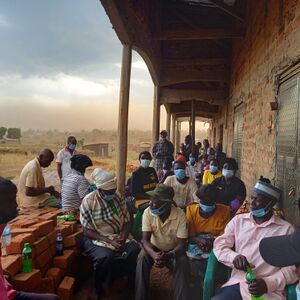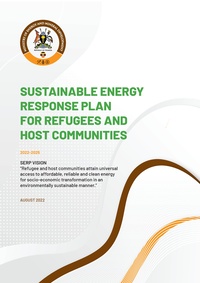The Sustainable Energy Response Plan (SERP) for Refugees and Host Communities in Uganda
The SERP envisions that refugee and host communities attain universal access to affordable, reliable, and clean energy for socio-economic transformation in an environmentally sustainable manner.
A Government-led, collaborative, participatory, and transparent process
The Government of Uganda (GoU) continues to lead efforts in implementing the Global Compact on Refugees (GCR) by promoting inclusive policies, integrating refugee response in longer-term plans at various levels such as the National Development Plan III (NDPIII) and with ministries leading comprehensive response plans for Education, Health, Jobs & Livelihoods, and Water & Environment. The Sustainable Energy Response Plan (SERP) for Refugees and Host Communities complements the holistic approach of the Comprehensive Refugee Response Framework (CRRF) and sets a precedent by integrating refugees into national energy planning, thereby emphasising the importance of energy access for an effective response within the Humanitarian, Development and Peace Nexus.
Uganda’s progressive refugee policy, predating the GCR, welcomed large numbers of displaced persons. This has led to the establishment of parallel systems, which addressed the needs of refugees and host communities separately through humanitarian partners’ services and local government services. The issues of energy access for the refugee populations in Uganda, mirror those of the local host communities. Thus, the SERP aims to strengthen the efforts to addressing the needs of all populations, avoiding the creation of separate or parallel solutions for each community.
GIZ’s Energy Solutions for Displacement Settings (ESDS) provides advisory services to the Ministry of Energy and Mineral Development (MEMD) and actively participates in the SERP task team within MEMD, in cooperation with UNHCR, the Office of the Prime Minister, the CRRF Secretariat, the Rural Electrification Agency and the World Bank.
The SERP with funding from the German Ministry for Economic Cooperation and Development was developed over 4 phases: 1. inception; 2. evaluation; 3. drafting; and 4. completion. Phase 1 involved a comprehensive situational analysis, including a review of existing NDPs, district development plans and refugee response plans, to achieve a common understanding among key partners and stakeholders on the vision, strategic objectives, and outline of the SERP. During phase 2 multiple consultations were held across 12 refugee-hosting districts taking place from November 2020 to March 2021 to gather invaluable inputs from multiple stakeholders including refugee and host community representatives, District Local Governments (DLGs), town councils, OPM, humanitarian agencies and partners, electricity service providers, traders, local vendors, and suppliers.
Phase 3 comprised of a reiterative process of providing a full SERP draft for discussion and revision. The SERP was endorsed by the CRRF Steering Group in December 2021. Consequently, phase 4 involves the finalisation, publication, dissemination, and advocacy of the SERP, which started with an official launch event on the 25th of August 2022 supported by the BMZ commissioned GIZ project ESDS.
The SERP can be downloaded here.
Read more about the lessons learned throughout this process here.
Partners
GIZ's Energy Solutions for Displacement Settings (ESDS) project cooperate with UNHCR to enhance the access to sustainable energy in displacement contexts, and the Energypedia page has been created to share learnings across various practitioners to spur the development of clean energy solutions.























